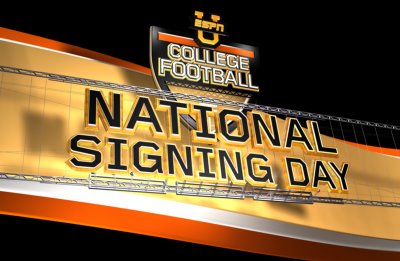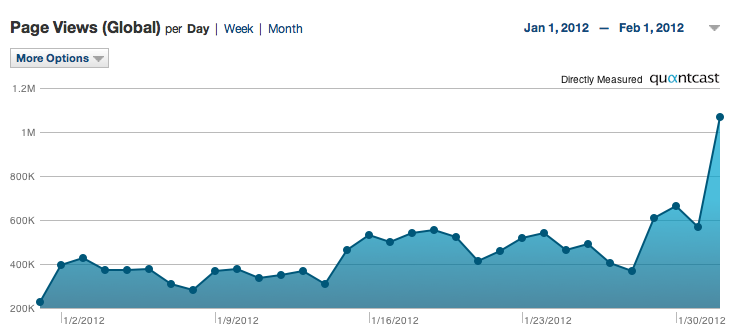
Yesterday was the biggest online traffic day of the entire sports year. I’ll attempt to prove it below with some graphs directly measuring traffic from Quantcast, but find me an expert in online sports media that doesn’t crown National Signing Day as the annual high in terms of daily page views across all US sports media properties.
In many ways, it’s like retail’s Black Friday. While just a normal day to many, there are tens of millions of fanatics out there dedicating an entire day to consumption. Black Friday is a holiday that people celebrate shopping. National Signing Day for many fanatics is a sick day, personal day, or just a totally non productive day dedicated to college football recruiting.
It’s not just the fact that tens of millions of people are online as many days of the year like the NFL Draft, Opening Day, Lebron’s decision, Tiger Woods’ infidelity, etc. pique fan’s interest. College football recruiting fans literally rack up page views faster than the only row of penny slot machines within 20 miles of a retirement community. Unfortunately for ESPN, it was just another weekday.
Traffic from bucknuts.com
Traffic from mgoblog.com
Traffic From Bamaonline.com
Multiply these spikes thousands of times over and you get the the biggest traffic day of the year!
For The Worldwide Leader, the fact that the overwhelming majority of this web activity takes place externally, and in most cases under the banner of their closest competitors, can most likely be classified as ESPN’s biggest business shortfall. In fact, in more than a decade of this industry, ESPN has failed every step of the way to capitalize on this massive industry.
While the loss in ad revenue, influence, and engagement with that massive audience has to be a source of concern, the fact that a good chunk of this fanatical audience ACTUALLY PAYS upwards of $10 a month must be particularly hard to stomach.
This isn’t the same as some of ESPN’s other shortcomings. They’re not THE Worldwide Leader in print as Sports Illustrated trumps them there. That is to be expected when they entered the market almost a half century after SI. Obviously hockey is another glaring area of weakness for ESPN but that’s an area they’ve just decided to ignore. And obviously, ESPN is the Worldwide Leader in countless areas of covering sports.
Given ESPN has invested billions in college football though – broadcasting all of the BCS games, having television deals with all the major BCS conferences, and getting ESPNU off the ground, ESPN being behind the pace in recruiting coverage online is a major strategic failure.
The fact of the matter is that ESPN has stuck their nose into the paid recruiting subscription business multiple times over and they’ve been repeatedly relegated back to the sidelines where they’re forced to watch their competitors dominate the market.
Rewind back to this summer when ESPN announced they were going to launch up to a dozen college recruiting sites to better compete in this market. I was extremely skeptical at the time. The sentiment was echoed by 24/7’s CEO and former Rivals CEO, Shannon Terry:
“I don’t know what they can offer that’s different from what’s already being done. … It can be more difficult for big companies to build highly specialized products like this and be as laser-focused.”
Half a year later, the initiative seems to be stuck at 7 sites:
Florida, Michigan, Georgia, LSU, Alabama, USC, Texas, and Oklahoma.
If you’re a fan of any of these schools and have no idea what I’m talking about, you’re not alone. The majority of these sites are essentially digital ghost towns with no article comments and message boards that haven’t been posted on in weeks, and in some cases months as seen below…
Not Much Going On In The Forums In Gator Nation
There are some sites that are plugging along, mainly the sites that partnered with ESPN on this front rather than launching from scratch. That said, the comments from long time community members speak volumes to ESPN’s ineptitude on this front. From Wearesc.com’s forums shortly after the relaunch:
“Lots of the cool features of the old board are gone (avatars, emoticons, quotes, thread bump, etc.) A lot of the best posters are nowhere to be seen either and there are times where the site seems like a ghost town.”
“I sorta feel like I’m in a dark room with a blindfold on. Still trying to find my way around, I guess. And while I’m hoping things will get sorted out and improvements will be made, it seems that there’s been a real drop-off in activity here. Until this site gets up to speed (hopefully), what are some other site options for SC football news?”
“I have been on the Wearesc for many years and this site is not acceptable. ESPN or not I have enjoyed accessing this site for its quality input and discussions related to USC. Honestly I am bummed about the blue font, looks old and cheesy. The time to access messages is horrible.”
At the end of the day, it really boils down to the fact that something plagues ESPN culturally that prevents them to either build or buy new innovative areas of their business in the web space. Having some familiarity with the business brain trust in Bristol and New York, I’d chop it up to lack of risk taking, people concerned about the safety of their high end jobs, being out of touch with new trends, too much red tape, lack of visionary leadership, and a stodgy way of viewing disruption within the media space.
This is why Rob Neyer left ESPN for SB Nation and abandoned a half baked network of blogs, Bill Simmons had to feign leaving ESPN before getting the corporate buy-in needed for Grantland, and three years later only a handful of big markets have ESPN local sites.
Retracing when and how ESPN could have broken into the college recruiting game in a more meaningful way shows a handful of instances of opportunity lost. If you’re really interested on this subject, I suggest you check out this article I did about a year ago on Scout, Rivals, and newcomers 24/7’s launch. At a high level, here are the most glaring instances where ESPN could have made a move to become a leader in college recruiting…
– In 2001, the Rivals Network of sites had filed for bankruptcy after the dot com bubble popped and thwarted their planned IPO. Although losing money, Rivals was the only real player in the field and had accomplished significant revenue and reach and was now available for pennies on the dollar. ESPN didn’t seize the opportunity, perhaps thinking recruiting networks would die out. Instead a group of investors bought Rivals, pumped new money into it, and sold it to Yahoo Sports for $100 million 6 years later. Yahoo’s acquisition of Rivals led to Yahoo Sports passing ESPN in terms of total audience, a lead they’ve held all but one one month over the last four years.
– After failing to rescue the Rivals network out of bankruptcy, founder Jim Heckman started what would become the Scout Network with the help of almost $2 million in new funding. ESPN could have potentially employed Heckman or helped fund or partner with Scout, but stayed the course of not getting involved in the space. In 2005, Scout was sold to Fox for around $60 million.
– On the heels of Fox’s acquisition of Scout, Rivals (the larger of the two networks and deemed to have the better technology) was independent and growing for nearly two more years before Yahoo bought them out in 2007. Seeing Fox’s push into the space with Scout and the fact that Yahoo was closing the gap in terms of overall audience, ESPN did not feel compelled to partner or acquire the market leader in the recruiting space even though the writing was on the wall.
– After Fox/Scout lost a dozen or so publishers in conjunction with a class action lawsuit settlement, ESPN got into the game and partnered with the disgruntled newly independent former Scout publishers in 2008. These sites represented some of the largest recruiting sites on the web. The momentum was short lived as the group of publishers were extremely disenchanted with the partnership model that lacked any collaboration and benefits from ESPN by means of online advertising revenue, content promotion, television appearances, and most significantly design and technology support. The prevailing buzz was that the entire partnership was built around ESPN over-promising and under-delivering any value to the publishers. ESPN made an attempt to buyout some of these sites but their overtures were not received well given the lackluster trajectory and vision of the original ESPN partnership as well as valuations that were deemed as “laughable.”
– After a couple of years at Yahoo, the Tennessee group who bought Rivals out of bankruptcy became disenfranchised with Yahoo and left to start another recruiting network venture in 24/7.
(Full disclosure: I’ve contributed articles to Scout as well as a former ESPN affiliate that is now partnered with 24/7. That said, those relationships were very casual in nature and hopefuly don’t sway my coverage here.)
Despite the track record of the management team and stagnation with Scout and Rivals, ESPN has chosen not to invest in, partner with, or acquire what may end up being the most successful recruiting network when the smoke clears.
– SB Nation has also carved out a nice college recruiting audience in addition to it’s websites covering other sports. SB Nation has taken funding from Comcast in addition to a partnership with Yahoo. Despite SB Nation’s recent hiring binge of ESPN talent, there remains no formal relationship between the two companies in regards to college recruiting or general local coverage.
– Sites like Eleven Warriors, MGoBlog, and WSU Football Blog have increasingly become hubs of recruiting reporting and engagement. Although a bit different than a structured entity ESPN could get involved with, ESPN hasn’t done anything substantive to harness the increasing influence of blogs on college football fans.
– Conversely, ESPN’s foray into college recruiting sites seems to be heavy on full time writers and extremely light on subscribers, readers, advertisers, and general public awareness. In almost all of the cases of these new ESPN sites, almost none of them would be considered a top five or even in most cases a top ten web property covering each school.
There is still plenty of time to right the ship for ESPN or perhaps shell out millions acquiring 24/7 or possibly SB Nation to address their shortcomings here, but the bottom line is pretty clear.
Out of all the areas ESPN has ambition to be the Worldwide Leader, their failure to get a toe hold in the college recruiting business is their largest business shortcoming. For over a decade they’ve failed at every twist in the road to capitalize in what became online sports media’s biggest cash cow. ESPN certainly isn’t hurting, but I’d imagine having Fox, Yahoo, and others thrive in this area while ESPN blows through money unable to get any significant traction is rather painful for a company so involved with college football.
For literally thousands of large to mid-size recruiting publishers, yesterday was the most exciting day of the year and a huge business driver. For ESPN, it was just another Wednesday.
